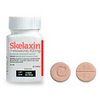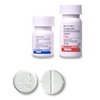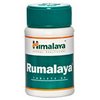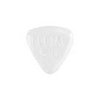 | Skelaxin Active Ingredient: Metaxalone Skelaxin is a muscle relaxant. It works by blocking nerve impulses (or pain sensations) in the brain. Skelaxin is used together with rest and physical therapy to treat discomfort associated with acute skeletal muscle conditions such as pain or injury. |
INDICATIONS
Skelaxin (metaxalone) is indicated as an adjunct to rest, physical therapy, and other measures for the relief of discomforts associated with acute, painful musculoskeletal conditions.
INSTRUCTIONS
Take Skelaxin exactly as prescribed by your doctor.
The recommended dose for adults and children over 12 years is one 800 mg tablet three to four times a day.
Ask your health care provider any questions you may have about how to use Skelaxin.
STORAGE
Store Skelaxin at Controlled Room Temperature, between 15°C and 30°C (59°F and 86°F). Keep Skelaxin out of the reach of children.F and 86
MORE INFO:
Active Ingredient: Metaxalone
- Skelaxin may enhance the effects of alcohol and other CNS depressants.
- Metaxalone should be administered with great care to patients with pre-existing liver damage. Serial liver function studies should be performed in these patients.
- Taking Skelaxin with food may enhance general CNS depression; elderly patients may be especially susceptible to this CNS effect.
- The carcinogenic potential of metaxalone has not been determined.
- Metaxalone tablets should not be used in women who are or may become pregnant and particularly during early pregnancy unless, in the judgement of the physician, the potential benefits outweigh the possible hazards.
- It is not known whether this drug is secreted in human milk. As a general rule, nursing should not be undertaken while a patient is on a drug since many drugs are excreted in human milk.
- Safety and effectiveness in children of 12 years and below have not been established.
The most frequent reactions to metaxalone include:
CNS: drowsiness, dizziness, headache, and nervousness or "irritability";
Digestive: nausea, vomiting, gastrointestinal upset.
Other adverse reactions are:
Immune System: hypersensitivity reaction, rash with or without pruritus;
Hematologic: leukopenia; hemolytic anemia;
Hepatobiliary: jaundice.
Though rare, anaphylactoid reactions have been reported with metaxalone.
 VoveranVoveran is used for treating mild to moderate pain. It may also be used for other conditions as determined by your doctor.as low as $0.47
VoveranVoveran is used for treating mild to moderate pain. It may also be used for other conditions as determined by your doctor.as low as $0.47 ZanaflexZanaflex is a short-acting muscle relaxer. It works by blocking nerve impulses (pain sensations) that are sent to your brain. as low as $0.84
ZanaflexZanaflex is a short-acting muscle relaxer. It works by blocking nerve impulses (pain sensations) that are sent to your brain. as low as $0.84 PonstelPonstel (Mefenamic Acid) is indicated for treating pain.as low as $0.52
PonstelPonstel (Mefenamic Acid) is indicated for treating pain.as low as $0.52 LioresalLioresal (Baclofen) is used for treating muscle spasms caused by multiple sclerosis or other diseases.as low as $0.78
LioresalLioresal (Baclofen) is used for treating muscle spasms caused by multiple sclerosis or other diseases.as low as $0.78 RumalayaRumalaya is a unique complex herbal formula that helps maintain healthy joints and reduce morning stiffness.as low as $35.6
RumalayaRumalaya is a unique complex herbal formula that helps maintain healthy joints and reduce morning stiffness.as low as $35.6 PletalPletal (Cilostazol) reduces attacks of intermittent claudication that may occur after walking.as low as $0.96
PletalPletal (Cilostazol) reduces attacks of intermittent claudication that may occur after walking.as low as $0.96